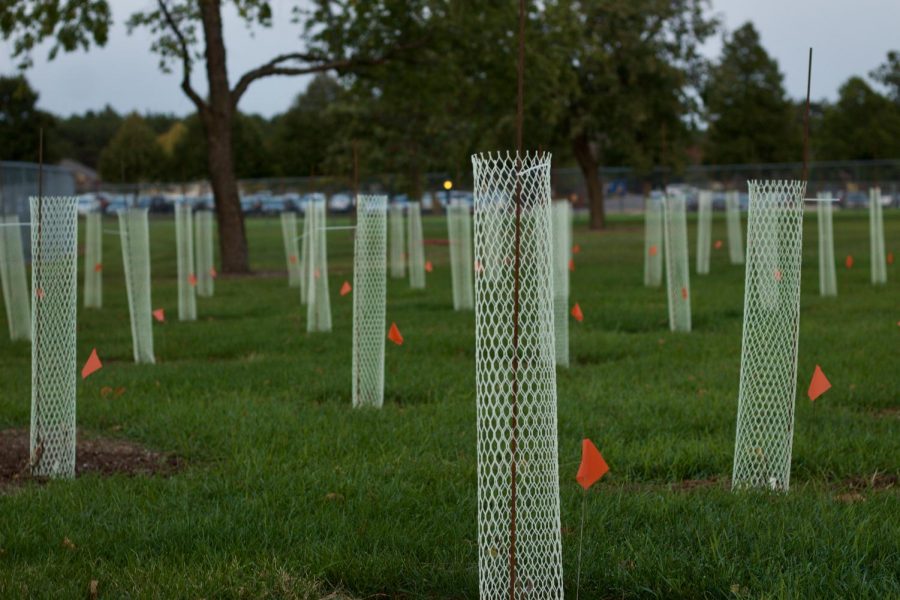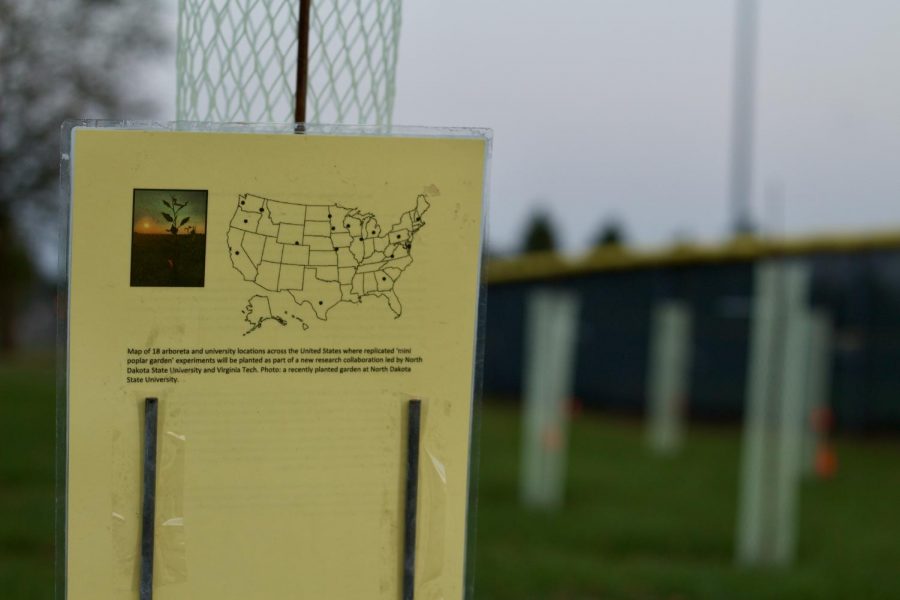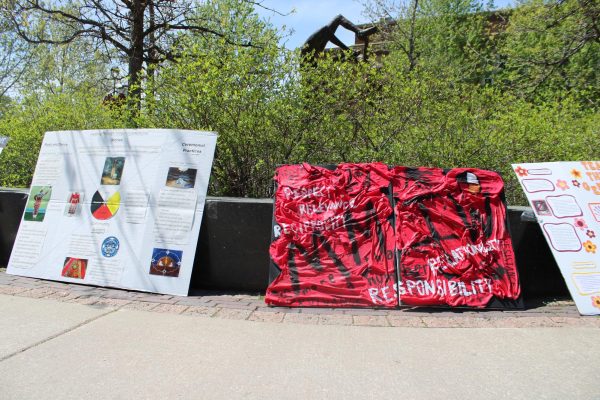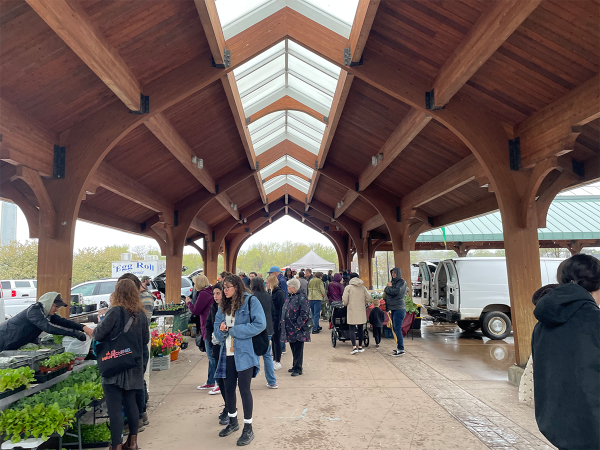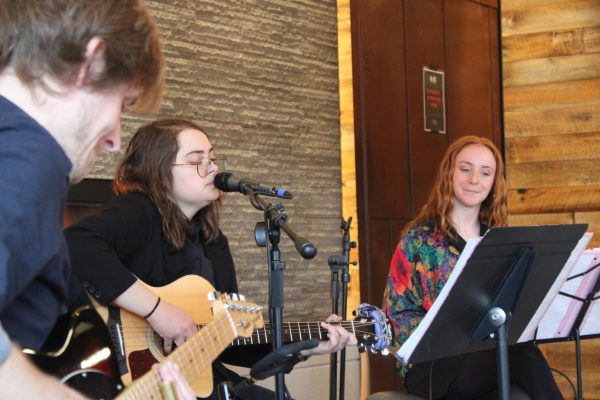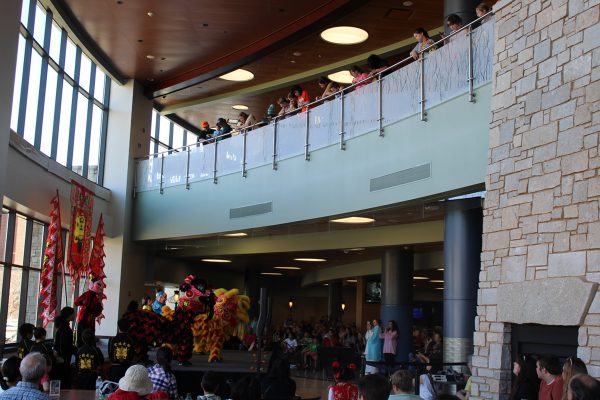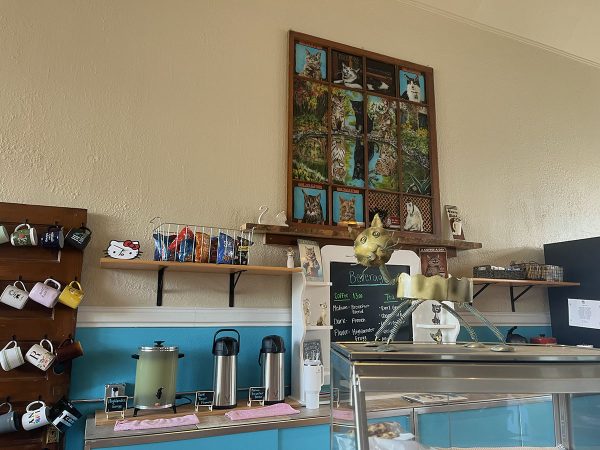Trees: a study on the root of climate change
UW-Eau Claire partners with National Science Foundation project on poplar gardens, nationwide collaboration
More stories from Evelyn Nelson
Photo by Isaac Rasset
Three plots of land were planted with trees on Bolinger Fields as a part of a transnational garden study.
The National Science Foundation — and now UW-Eau Claire — is getting to the root of climate change through a transnational garden study on trees.
Three plots with a total of 100 poplar trees were planted on Sept. 25 on Bollinger Fields at UW-Eau Claire. These planted tree gardens will be an addition to the current arboretum on campus and provide data for national climate change studies.
“We are trying to understand — using all the different genetic lines and different locations — how these trees might adapt to climate change,” Nora Mitchell, an assistant professor of biology at UW-Eau Claire, said.
The project was first brought to Eau Claire through North Dakota State University’s partnership with the National Science Foundation, Mitchell said. Now, the biology and grounds services departments at UW-Eau Claire are working together on the “Mini Poplar Gardens” project.
Daria Hutchinson, landscape architect in the grounds services department, said her position allows her to help redesign the campus community through the context of their geographical landscapes.
“These landscapes enable things like trees to adapt to climate change and mitigate its root causes,” Hutchinson said. “That is one of the main intents of this project, to look at what the adaptiveness of trees are in varied climates and how it will impact a landscape.”
UW-Eau Claire is one of the 18 arboretums and universities across the United States that are providing research — on the adaptation of tree species in climate — to the NSF program and North Dakota State University.
The UW-Eau Claire arboretum was originally founded in 2017, which encompasses all trees on campus and in areas across Eau Claire, including Putnam Park. The arboretum is connected to various nationwide environmental programs: Tree Campus Higher Education and ArbNet.
Mitchell said the biology department’s groundwork for the project is a “common garden experiment,” where those involved in the project will take different plant lineages and grow them in the same environment.
“If you grow (plants) in different places, they will look different because of the way they respond to that individual environment,” Mitchell said. “Those differences are due to the environment they were raised in, not due to genetics. If we raise plants in the same location, then any differences we see we can infer are due to genetic differences.”
Thu Nguyen, a third-year biology and pre-professional health student, said the gardens project has allowed her to incorporate knowledge from both of her educational pathways.
Nguyen first became involved in the poplar gardens through prior independent studies with Mitchell for her sunflower research lab this past summer.
“I have a great love for plants,” Nguyen said. “Although I am a pre-med (student), I love the ecology side of biology as well. There are researches that show great correlation between environment (ecology) and human health.”
Mitchell said there is a sense of power as students and faculty harness the understanding of their research together.
“This (project) provides a really great opportunity for students to get involved in even more hands-on research and also see the collaborative nature of science,” Mitchell said. “We have multiple institutions across the United States working together. Here in Eau Claire, we have a collaboration between the arboretum, facilities, biology (department) and between different students.”
On the day of planting earlier this fall, Nguyen said she enjoyed seeing the collaborative efforts of all areas across campus.
“We had a lot of fun on the day of planting,” Nguyen said. “We received a whole lot of help from both faculty and student volunteers. Needless to say, I had a lot of fun and a great experience.”
Hutchinson said the gardening project allows her to continue working with students on sustainability practices and initiatives taking place on campus.
“I like getting information out to students,” Hutchinson said. “I don’t know that they are always aware of what is going on, on campus and I think we could be better about getting that story (of climate change) out.”
The five-year-long project is currently facilitated by student volunteers in the biology and facilities/grounds departments, Hutchinson said. In addition to scientific research, the project will also serve as this year’s Arbor Day campus-wide event in April.
Nguyen said she looks forward to seeing how the project will expand throughout the next five years as the trees continue to develop and more communities become involved in the research.
“This project is on a national scale,” Nguyen said. “It is great to know that there are many (locations) across the country who are also doing what we do at Eau Claire. I would love to see the project go to its maximal growth.”
To become involved in the project or volunteer with future examination of the poplar trees, contact Mitchell at [email protected].
Nelson can be reached at [email protected].

